There were legends in the swamp, and Billy Guidry knew it. Some of them crawled and swam, like Gus, the infamous 14-foot gator that hung out near the put-in and dined on ham sandwiches and lunch scraps the tourists fed him. Gus was beloved. A gentle giant, they all said.
The locals just shook their heads and whistled low under their breath.
“He’s gentle until he swims off with your first-grader,” Billy’s Uncle Seth would say. But it was Uncle Seth who kept a pet cottonmouth in an old fish tank in his living room, so he might not have been the best authority on Gus and his child-knapping proclivities.
Every year, come gator season on toward the end of August, Gus would disappear. And he’d stay disappeared until sometime in October. Then, he’d show up again, to the delight of the tourists and to the chagrin of folks who motored by the dock only see the brightly dressed tourists wearing sun dresses and khaki pants tossing the wings from Church’s chicken buckets into the gator’s mighty maw.
There were other legends, too, like Billy’s grandfather, Pete, who shot Kyle Guillory in the leg for crimes as yet undetermined. As they hauled Grandpa Pete off for a stretch at Angola, Billy, just a kid at the time, remembered his grandfather cursing across the little courtroom in Morgan City at the Guillory clan.
More Like This
“You assholes think three years is just?” the old man shouted. “It’s worth every God-damn minute. And when I get out, that Kyle Guillory is gonna get the rest of the shells from my old ought-six, and I’ll happily pay the price in time for that, too, you sons of bitches!”
It wasn’t exactly a family feud. Billy grew up with Kyle’s son, Simon. They went to school together. Played on the state runner-up football team together. They lived just down the old oyster-shell road from the Guidry place, back up in the cypress trees. But there weren’t exactly friends. Nor were they enemies. Just boys that had grown into men and men who did what they had to do to make ends meet in the swamp. Billy fixed boats when he wasn’t fishing. Simon, after a few fits and starts, started roughnecking offshore a month on and a month off. But somehow, Kyle had gotten on old Pete’s bad side.
Grandpa Pete got out of Angola early for good behavior, but never shot Kyle Guillory again, though he did get drunk in town one night and “accidentally” run Kyle and his truck into the canal. Nothing came of it. Kyle never raised a fuss—perhaps his crimes, which Billy often wondered about—were worth the insurance claim on his old F-250.
Billy was glad his grandfather kept his cool from there on out. It was during those years that Pete taught Billy to fly fish and tie flies. Always something of an eccentric, Pete would tell Billy stories of how he would out-fish “the boys” with on old bamboo cane pole and some hand-tied “minnah flies” he wrapped on hook shanks using white hen feathers and strands of six-pound mono.
“Then I got my hands on a fly pole I found advertised in the back of an old copy of Outdoor Life when I got my last two molars pulled at that crooked dentist’s office Morgan City,” Pete told his grandson, talking as much with his hands as with his gummy mouth. “Only damn good thing that ever came out of that dentist’s office. Well, ‘cept for the receptionist, Marlene. She was a piece, let me tell ya. Don’t tell your grandmother I said that.”
Billy now possessed that old glass Fenwick that got his grandfather started. It cost Pete a couple gator hides at market, or so he was told, but today, it rested on nails above the front door of the cabin, right below the 12-gauge and the .22. And, when he wasn’t hustling up the next meal for his family or rebuilding a neighbor’s outboard, he still liked to fly fish the swamp. He’d graduated from the wispy Fenwick to a stout graphite 7-weight, but the idea was still the same. “Minnah flies” became Clousers and Deceivers. Black ‘buggers pulled tight against the bald cypress knees would hammer bream and flyers and sometimes bass would nail a popper, but that wasn’t happening as often.
Lately, the silver carp had done a number on the bass and the panfish in the river—there were still a few places where a fellow could cast to bucketmouths, but nothing like before. But, even in the pirogue, pushing through skinny channels and canals his ancestors dug a century before, there were fish to be found. And, it was almost too damned dangerous, during certain times of the year, to take skiff out on the water. The motor would stir up all the carp, and they’d start jumping. Nothing hurts like taking a 20-pound carp straight on the nose, as Billy could attest.
He could also attest to the fact that the carp represented only one change to his beloved swamp. It used to be, you’d have to motor down the river a good two hours before the tides that pushed the fresh river water back upstream would be noticable. Now, in only about 45 minutes at the paddles, Billy could taste the briny water of the Gulf. He’d seen more and more Vietnamese shrimpers heading downriver, too. Crabbers and oystermen were farther upriver than they’d ever been. And the cypress forests? They were looking pretty bleak in the lightly salted waters. In just his lifetime, Billy had noticed their slow retreat. Miles of skeletal trunks, bleached by the southern sun, reminded him how much had just gone away.
Things were changing.
Anybody could tell. And everybody knew it, even if they balked at the suggestion that “climate change” was on their doorstep. Their politics wouldn’t allow it.
Then Katrina hit off to the east and a month later Rita went off to the west. The Guidry house, which sat on pilings for events just like these, lost its tin roof, but survived the storm surge by a good two feet, Billy guessed. The old live oaks planted back when the Guidry name was new to the swamp took a beating, and one of the big branches that hung over the drive came down and missed Margaret’s fancy new hybrid by about six inches.
Why his wife needed that rice-burner was beyond him, but she was out there with him and his chain saw when the storm passed, moving timber and clearing the path back to civilization, as much as it pained Billy to do so. He’d managed to salvage most of the furniture after the roof peeled off the flat boards like somebody opening a sardine can, but he and Margaret lost their share, too. That Sunday after Rita passed, everybody was in church. Nobody said much, except for how they couldn’t recall two such big storms making landfall in such quick succession. Others simply thanked God that their little slice of the Atchafalaya rested neatly between the two hurricane paths and that they got the least of the worst.
The Gulf seemed to get a lot closer after Rita blew through. For the first time, with the storm surge, Billy could taste the ocean on his lips as Rita blew herself out. Brackish water made it all the way to the house that September. It dutifully retreated, but not as far. And Old Gus reported back to the dock not long after Rita. There were fewer tourists that fall. And there were empty FEMA trailers everywhere.
And the shrimp and the bunker that came up the river with that brackish water brought redfish and speckled trout to the marsh. Sheepshead. Black drum. Earlier that summer, Billy marveled at the sight of a pod of bottlenose dolphins pushing up one of the canals, the green cypress forest of his childhood the backdrop for this first-ever sighting.
As a fly fisher, Billy loved it, even if it didn’t feel quite right. Redfish filled the freezer. Trout, too. They were better table fare than silver carp or “silverfin” as the chefs in New Orleans called them, netted by the dozen in the channel in front of his dock. And, of course, the reds and the trout would hit a fly, unlike the carp who ate plankton. The very same plankton that fed the shad that fed the bass. Yep. Things were changing. Things were just … going away.
And then the legends of the swamp, both two-legged and of the reptilian variety started to go away, too. Old Grandpa Pete had passed away a year or so after Rita, and Billy was surprised to see Kyle Guillory at the funeral, hat in hand. Simon, too. The following fall, after gator season, Old Gus didn’t come back to the dock down by the marina.
Billy checked in every now and then, curious as to the big gator’s whereabouts. He knew nobody had taken the beast during the season—he and everybody else would have certainly heard about that. All through October, and no Gus.
And all through the winter and into spring, Gus failed to come back. By then, Billy just guessed that Gus had finally succumbed to one too many sharp chicken bones, or, like anybody who ate like a Louisiana resident, had developed health issues just too severe to overcome. Occasionally, the tourists would still show up, ham sandwiches and the Colonel’s best in hand, only to wander along the dock without catching a glimpse of the big, charismatic lizard.
A few years after his grandfather had passed, and since anyone had seen Gus, Billy was paddling his pirogue along the salt line, which had progressed even farther up the river since he’d last visited. Gator season had just ended, and he’d managed a couple of nice ones in a quick day on the water. But now, with things cooling off a bit, and quiet mist settling over the swamp, Billy was fly fishing. He’d poked his way down an old canal that he hadn’t navigated in some time, and he knew it opened up into what the old-time swampers would call a “prairie”—a stretch of shallow, peat-bottomed, open fresh water.
Up against the cypress knees, Billy knew the bream would be holding, and he spent one of those perfect early fall days in the swamp casting his spider fly to the timber and collecting enough of the panfish for a weekend fish-fry. That afternoon, as he quietly ate a turkey sandwich under the Spanish moss shading the swamp, he saw a black bear sow and two cubs pushing water through the cypress knees. Mom waded while the yearlings half swam and half floated through the trees. Billy didn’t make a sound, and the bears never saw him.
It had been ages since he’d seen bears in the swamp. They were the things legends were made of—giant, mud-caked creatures that ate gators and drank black water and ran off with toddlers in the night. Billy knew better, of course, and he was thrilled to see the trio wandering among the cypress. A good omen, he assumed.
He paddled farther into the swamp that afternoon, and discovered an ancient canal that had likely been forgotten by the great-grandchildren of the men who dug it more than a century ago. The swamp was slowly reclaiming it, but it was wide enough to paddle through and a good three feet deep. New country in a place where all feels familiar exhilarated Billy. Here, away from the sounds of outboards and apparently too far away from the main channel of the river for even the carp, everything felt right.
He pulled two nice bass from the edges of the canal, including the biggest largemouth he’d brought to hand in years—probably six pounds and surging with life. This was how things were supposed to be, he thought, before we “improved” them. It was bittersweet.
And then he saw the legend. Ahead in the canal, a giant set of eyes surfaced and glared back at him. There was no mistaking it. It was Gus. All 15 feet of him by now, and likely happy as a clam with a belly full of native fish, the old gator was unmistakable.
“You old son of a bitch,” Billy muttered, a grin slowly crossing his face. “Go figure you’d find this spot before I did.”
Billy dipped a paddle into the dark water and pulled his boat slowly toward the giant monster. Gus didn’t move, but he blinked a wary eye at the man coming toward him. One more pull with the paddle, and Billy was within a few feet.
It was Gus, all right. He’d seen that gator a thousand times, and there was no doubt. What made the big critter give up the life of a Bourbon Street beggar, Billy couldn’t say, other than to suspect that life was just too good out here where the people weren’t.
As Billy got closer, Gus slowly submerged. Billy watched as his boat pulled slowly over the giant beast, it’s mottled back moving slowly through the tannic water underneath him. No panic. No hurry. Just one swamp legend greeting the grandson of another.
Billy got home that evening, and Margaret met him at the dock. He handed her the cooler of fish and noticed right away that something was amiss. Her face was worried. She’d been crying.
“What’s up?” he asked.
“One of those big rigs just exploded off the coast,” Margaret said. “Simon Guillory was on the deck when it happened. Nobody’s heard from him.”
And nobody ever would, again, of course. And Billy knew, as sure as Gus had found a new paradise, that more changes to the swamp were coming soon.







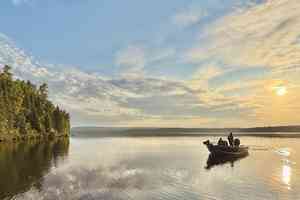


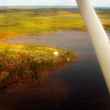
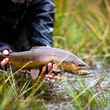
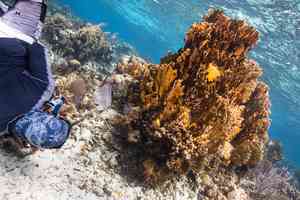

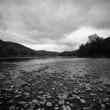
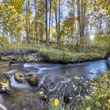



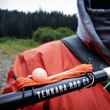
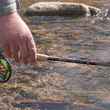



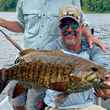
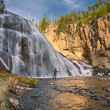
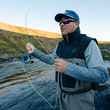

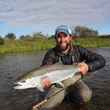
Comments